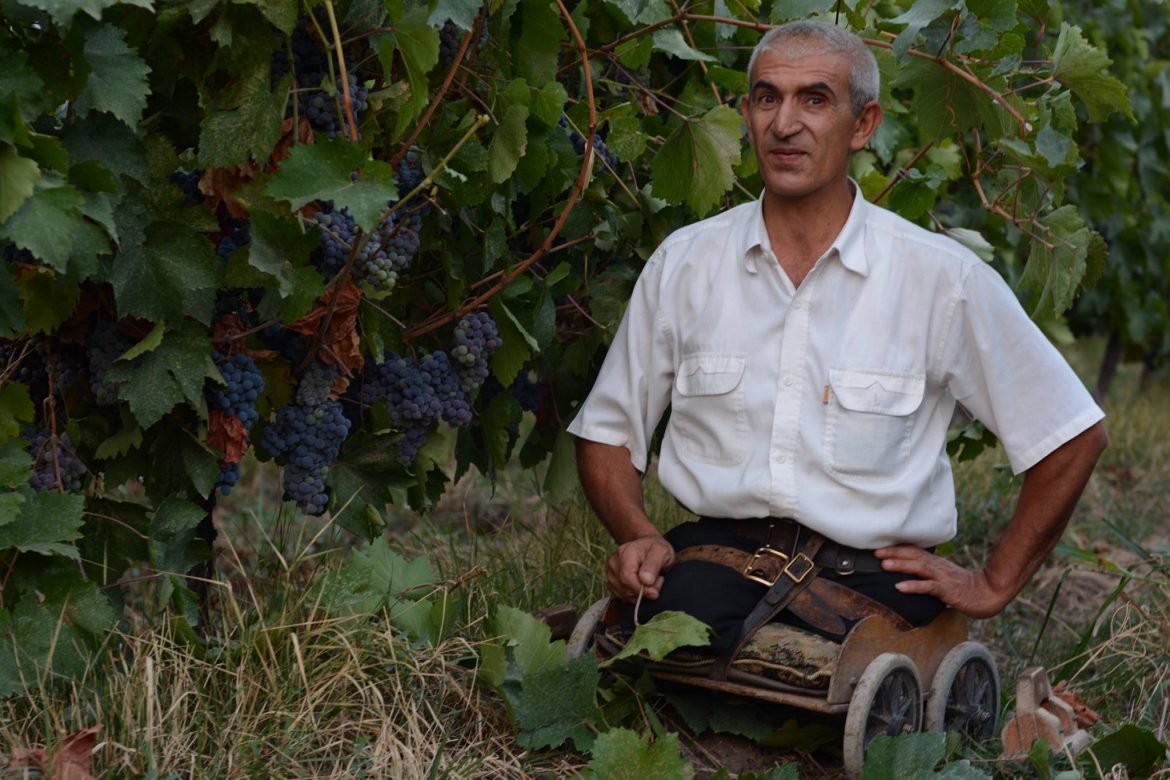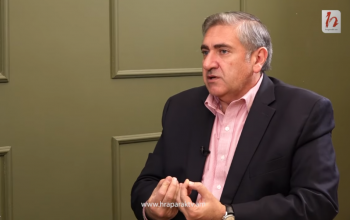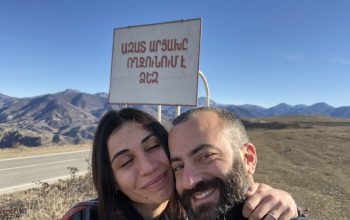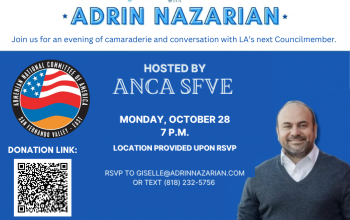By Siranush Sargsyan
“We were living peacefully in Hadrut, when everything changed in a second,” Yakov Altunyan begins his story. Altunyan lived through three wars, lost his home and homeland and was forcibly displaced. The Weekly met not in his hometown, but in the Armenian city Abovyan.
Altunyan, 55, is from the village of Mets Tagher in the Hadrut region of Artsakh, which has been occupied by Azerbaijan since the 2020 war. However, the bitterness of the war and its aftermath knocked on Yakov’s door during the first Artsakh war in 1993, when at the age of 27 he was wounded by a mine during a reconnaissance and lost two legs. He made a wheelchair that he uses to “walk” with his hands.

Altunyan believes that an Armenian man should build a house, create a family and plant a tree. After the first Artsakh war, he married Inga, and they had three children. Now his daughter, Mariam, has given them a grandchild. While rebuilding his grandfather’s house and adjusting to his “walking hands” wheelchair, he took the third step: planting a tree. He has been growing a vineyard since 2007 and made about 2,000 liters of wine from the Khndoghni grapes. Last year, he and his family planned to start their own winery. He also had two mulberry orchards, from which he made the famous Artsakh mulberry vodka. Altunyan at the Togh Wine Festival with his daughter and wife and the wines he produced
Altunyan at the Togh Wine Festival with his daughter and wife and the wines he produced
The family also practiced beekeeping and gave pure honey to their relatives. Altunyan regrets how they left the ripe grapes in the field, wine and vodka in the cellar and famous Hadrutian pickled vegetables in clay, along with everything else in their village.

“On the 17th day after the start of the war, we left the village, because it was impossible to stay under the bombardment. Only the young people were left to defend the village. We left everything and moved to Abovyan. Of course, we thought we would definitely go back. Until the end, we believed that we would go back, that the ceasefires would be strong, but the next day it would start again,” Altunyan says.

Altunyan’s only son Grigor was a conscript in the army during the war in one of the most intense areas of fighting. He takes pride in his son’s heroism on the battlefield, proudly showing off the Medal of Courage he was awarded.

“We left the graves of our ancestors, our history, our past, our land, our nature, everything. We must take care of our past. It’s not just about remembering. It’s about keeping your footing strong,” Altunyan says. “Now we are in the air. We have no place to set foot. We have become like Western Armenia, because our past has been taken away from us. Maybe because we have remained faithful to humanity, and the centers of human civilization, the West, have been far from it. Now I understand that we should not have been so humane and Christian, because our opponent was not like that. I am not talking only about our enemy, Azerbaijan or Turkey. I am talking about the same centers of Western civilization. We are forgotten because our lives are worthless for them,” he continues.
Altunyan, who has seen three wars, cannot help but compare them.
“In the first Artsakh war, we thought about helping each other. The whole nation was united. Maybe the fuel was not enough, the living conditions were not good, but we helped each other. It did not matter if you knew the person in need or not. We all lived in common interest. During this war we were not like that. We were instilled with individuality in order to take victory away from us and change our values. The images of our leaders have also changed. Many generals have become businessmen. In the first war we did not have a professional army, but we had values. Our values have changed,” Altunyan says.
When speaking about his plans for the future, his face sinks.

“A person starts from scratch again, several times in his life, and it is not bad, but we must unite again, rediscover ourselves, first as a nation, as a state. To start again, it is necessary to give Artsakh status and security guarantees. I am ready to become the first settler in liberated Hadrut, but now it is not realistic. It is only a great wish and dream. I do not have a house. The most important thing for me is to be attached to the ground, to plant a garden. That was my way of life. Now I do not know where my house and garden will be. But if I receive support, I am ready to go back and re-establish my house and vineyard in a handful of villages in Artsakh, and if that is not possible, to live and create in another part of Armenia,” Altunyan says.
Since the Weekly’s meeting with Altunyan, he and his family have moved back to Stepanakert to an apartment provided by the government. Officials have also promised him a home in a rural area where Altunyan hopes to once again have a vineyard and produce Artsakh wine.
Siranush Sargsyan is a historian and political scientist. She’s earned her degrees from Artsakh State University and the Public Administration Academy of the Republic of Armenia. Her master thesis focused on the issues surrounding the development of the party system in Nagorno-Karabakh. She’s taught history in a village in Martuni and has served as the chief specialist of the Republic of Artsakh National Assembly in the Standing Committee on Science, Education, Culture, Youth and Sports. Siranush takes great interest in conflict resolution, gender equality and education.





